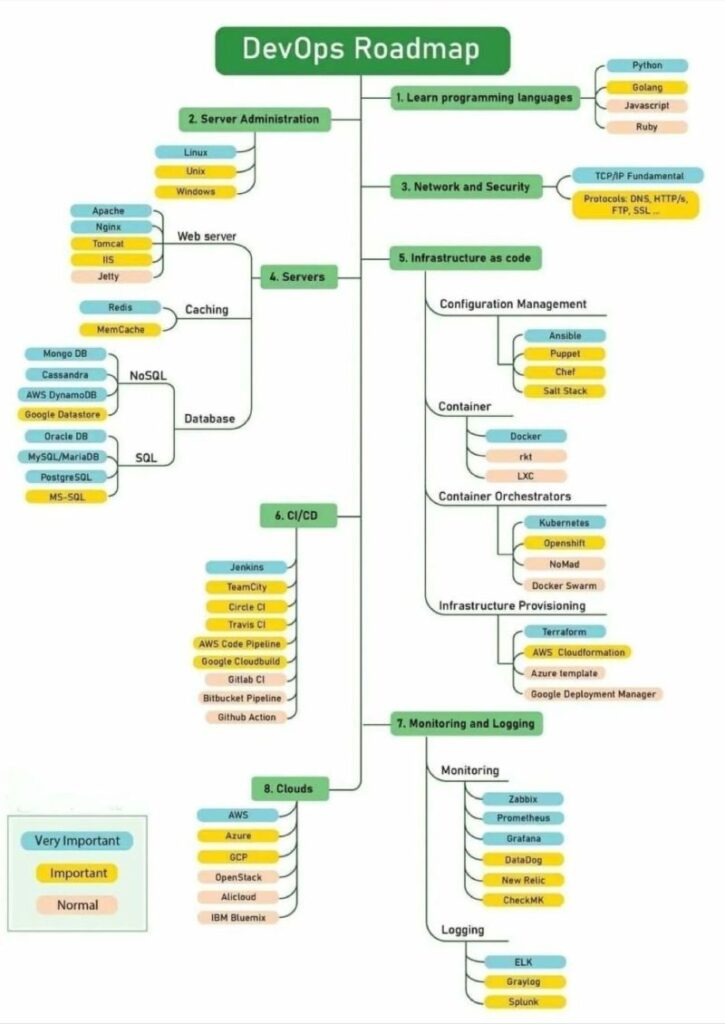DevOps Engineering Roadmap
DevOps is a culture, a set of practices that automates the processes between software development and IT teams. DevOps aims to build, test, and release software faster and more reliably. If you’re interested in becoming a DevOps engineer, here’s a path you can follow:
1. Learn the basics of software development
DevOps engineers need to have a solid understanding of software development. This includes programming languages, version control systems, and software testing.
2. Learn a scripting language
Scripting languages like Python, Ruby, and Bash are essential for DevOps engineers. These languages are used to automate tasks and build scripts that can perform tasks like deployments and monitoring.
3. Learn about containers and virtualization
Containers and virtualization are important concepts in DevOps. Tools like Docker and Kubernetes are used to manage containers, which allow applications to run consistently across different environments.
4. Learn about cloud computing platforms
DevOps engineers need to understand cloud computing platforms like AWS, Azure, and Google Cloud Platform. These platforms provide on-demand computing resources and are used to build and deploy applications.
5. Learn about DevOps tools
There are many DevOps tools out there, and it’s important to know how to use them. Tools like Jenkins, Ansible, and Terraform are used for automation, deployment, and infrastructure management.
6. Gain practical experience
Finally, it’s important to gain practical experience. Look for internships, volunteer opportunities, or personal projects where you can apply the skills you’ve learned.
By following this path, you can become a DevOps engineer and help your organization build and release software faster and more reliably.
7. Develop soft skills
In addition to technical skills, being a successful DevOps engineer also requires soft skills. It is essential to learn how to communicate effectively with team members, collaborate on projects, and solve problems. DevOps engineers need to be able to work well under pressure and handle multiple tasks simultaneously.
8. Stay up-to-date
The world of technology is constantly changing, and it is crucial to stay up-to-date with the latest trends and developments. DevOps engineers should attend conferences, read industry blogs, and participate in online forums to stay informed about new tools and techniques.
9. Continuous improvement
Continuous improvement is a critical aspect of DevOps. DevOps engineers should continually evaluate processes and tools to improve efficiency and effectiveness. They should also seek feedback from team members and customers to identify areas for improvement.
10. Certification
Certification is not a requirement for being a DevOps engineer, but it can be beneficial. Certifications like AWS Certified DevOps Engineer, Google Cloud Certified – Professional Cloud DevOps Engineer, and Certified Kubernetes Administrator can demonstrate your expertise to potential employers.
In conclusion, becoming a DevOps engineer requires a combination of technical and soft skills, practical experience, and continuous learning. By following this path and staying up-to-date with the latest trends and developments, you can become a valuable member of a DevOps team and help your organization build and release software faster and more reliably.
If you are interested in learning more about DevOps and how it can benefit your organization, please don’t hesitate to reach out to us. We are always here to help you on your journey towards becoming a successful DevOps engineer.

